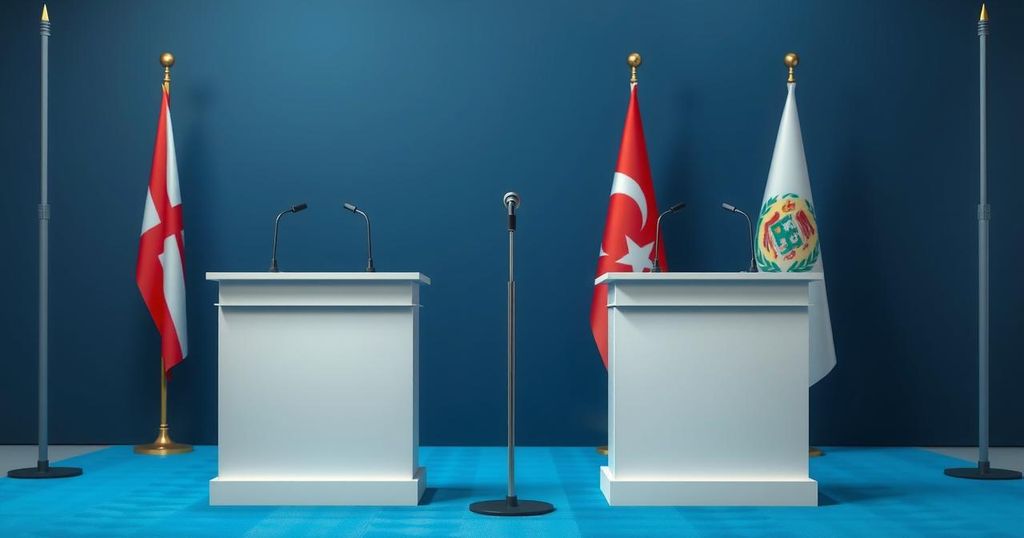World news
DEFENSE INTELLIGENCE AGENCY, DONALD TRUMP, EUROPE, EUROPE/ASIA, FOX NEWS, GETTY IMAGES, HEZBOLLAH, INTERNATIONAL RELATIONS, MA ZHAOXU, MIDDLE EAST, MIDDLE EAST AFFAIRS, NUCLEAR POLICY, PUTIN, REBECCA NOBLE, RUSSIA, SANCTIONS, TRUMP, U. S, UKRAINE, VLADIMIR PUTIN, WAR, WASHINGTON INSTITUTE FOR
Elena Martinez
0 Comments
Trump and Putin Align on Iran’s Nuclear Ambitions and Regional Stability
President Donald Trump and Russian President Vladimir Putin agree on the necessity to prevent Iran from acquiring nuclear weapons. Discussions included cooperation in the Middle East and the cessation of nuclear proliferation. Trump has reiterated sanctions on Iran while expressing the need for diplomatic negotiations to avert military action. Russia’s push for eased sanctions contrasts with U.S. strategies, highlighting differing international approaches to Iran’s nuclear program.
The White House has announced that President Donald Trump and Russian President Vladimir Putin share a unified stance regarding Iran’s potential acquisition of nuclear weapons. In a phone conversation, the leaders discussed strategies for concluding the war in Ukraine and jointly emphasized that Iran must not gain the capability to threaten Israel. They expressed the need for cooperation in the Middle East to mitigate future conflicts and prevent the spread of strategic weapons.
During this discussion, both leaders criticized the proliferation of nuclear armaments, asserting the necessity to engage with other nations for optimal enforcement. Trump has also reinstated a maximum pressure campaign against Iran to thwart its nuclear ambitions. This campaign is underpinned by sanctions aimed at Iran’s oil exports and other economic sectors.
In contrast, Russia has requested that the U.S. ease sanctions that have devastated Iran’s economy. Following a meeting among representatives from Russia, China, and Iran in Beijing, a joint statement called for a return to political engagement and diplomatic dialogue. This collaborative approach emphasizes mutual respect as the only viable solution to concerns over Iran’s nuclear program.
Furthermore, the relationship between Russia and Iran has strengthened, especially as Russia has employed Iranian-made drones in the ongoing conflict in Ukraine. Reports from the Defense Intelligence Agency indicated that Iran has provided substantial drone support to Russia, although Iran has denied such claims. Trump, apprehensive about Iran’s nuclear capabilities, has cautioned that military intervention could be necessary if diplomatic negotiations fail.
In a recent interview, Trump expressed his preference for negotiation over military action, stressing the urgency of resolving the situation. He articulated concern that time was running out for a peaceful agreement and highlighted the potential consequences of failing to negotiate with Iran. Ultimately, the ongoing dialogue surrounding Iran’s nuclear capabilities remains a focal point for international relations involving both the U.S. and Russia.
In summary, the coordination between President Trump and President Putin regarding Iran’s nuclear ambitions highlights the necessity for mutual cooperation in global affairs. While both leaders agree on preventing Iran from gaining nuclear capabilities, ongoing tensions persist, particularly concerning sanctions and military support in conflict scenarios. The urgency conveyed by Trump regarding negotiations underscores the delicate balance of diplomacy and potential military intervention.
Original Source: www.foxnews.com




Post Comment